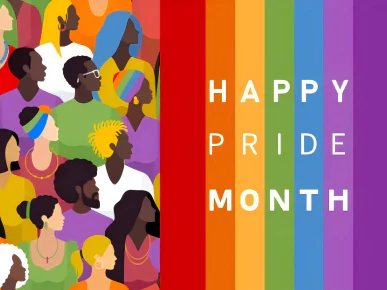Every June, cities around the world transform into vibrant tapestries of color, music, and movement. Rainbow flags flutter from balconies. Streets come alive with parades. And communities—both online and offline—unite to celebrate Pride Month, a global tradition born from courage and resistance.

Yet, behind the joy lies a deeper truth. Pride began as protest. In 1969, the Stonewall Uprising in New York ignited a movement—an urgent call for justice, dignity, and visibility for the LGBTQ+ community. A year later, on June 28, 1970, the first Pride marches took place in New York, Los Angeles, and Chicago. These were not festivals. They were acts of civil resistance. Over the decades, Pride grew into a global movement, encompassing both joyful celebration and unwavering activism.

Today, Pride is as much about expression as it is about reflection. It's a time to honor those who came before, to recognize ongoing struggles, and to stand in solidarity with those whose safety, love, or identity are still under threat. But Pride is also deeply personal. It's found in everyday acts of authenticity and care—in the quiet, unglamorous moments when you choose to show up for yourself.
That's where inclusive fitness begins to matter.
Fitness Spaces Haven't Always Felt Safe—But That's Changing
Too often, traditional fitness culture has sent a message—spoken or not—that you need to look or move a certain way to belong. This message has left many queer and trans folks feeling judged, unwelcome, or invisible in gyms and group classes.
Whether it's the binary locker rooms, body-shaming culture, or performative hypermasculinity, many people in the LGBTQ+ community have simply opted out of mainstream fitness. And who could blame them?
The fitness world often overlooks how triggering public spaces can be—particularly for those managing gender dysphoria, body image struggles, or complex relationships with physical performance. Many LGBTQ+ individuals grew up hearing their bodies were "wrong," "too much," or "not enough." That kind of messaging doesn't disappear overnight.
But now, the landscape is shifting. Thanks to virtual platforms, inclusive instructors, and a new generation of wellness advocates, more people are finding ways to move that feel safe, affirming, and joyful.
Movement is no longer just about aesthetics. It's about mental health, emotional grounding, and self-connection.

Stephanie's Story: Reclaiming Her Body Through Community
Yesoul has partnered with Stephanie to promote a more inclusive approach to fitness. Together, they are working to create spaces where people from all backgrounds can feel welcome and empowered through movement.
Stephanie Lane, a spin coach and proud member of the LGBTQ+ community based in Brighton, UK, understands firsthand the barriers many face in fitness spaces.
"I was the awkward teen at the back of the class, terrified to get anything wrong," she recalls. "The gym always felt like a place for other people—confident, straight, muscular people. Not someone like me."
Years later, she discovered spin. The beat of the music, the rhythm of the ride, and the dim lighting created a liberating experience. "It didn't matter what I looked like. I just had to show up. That was the first time movement ever felt like mine."
During lockdown, Stephanie began teaching virtual classes from her living room. Her audience grew rapidly, drawn not by promises of quick results but by the inclusive, judgment-free environment she fostered. Recognizing the impact of her work, Yesoul partnered with Stephanie, amplifying her message of acceptance and self-expression. Through this collaboration, Yesoul featured Stephanie's spin programs on its platform, reaching a global audience and demonstrating the brand's commitment to diversity and inclusion within the fitness community.
"People wrote to say they cried during class," she says. "Not because it was hard, but because it was the first time they'd heard a fitness instructor say, you're already enough."

Luis's Story: Redefining Strength Outside the Binary
Luis Martinez came from a performance background. As a competitive ballroom dancer, their life was full of costumes, choreography, and controlled movement. But as a nonbinary person, that world felt restrictive.
"There was always a gendered role I had to play," Luis shares. "Even in fitness spaces, I'd get misgendered constantly. I didn't want to fight to exist every time I worked out."
When they transitioned into coaching, Luis brought that awareness with them. They began leading online spin classes rooted in emotion, not ego. Their rides include breathwork, affirmations, and music that reflects queer culture—from soft pop to protest anthems.
"I tell people: move the way your body wants to, not the way someone told you to."
For Luis, fitness isn't about fixing your body. It's about coming home to it.


Why At-Home Movement Matters
In a world still full of structural barriers and everyday microaggressions, at-home workouts have become more than just a convenience—they're a refuge.
The freedom to move in your own space, wear what feels right, and choose your own music or instructor creates a liberating environment for many LGBTQ+ folks.
You don't have to navigate gendered bathrooms. You don't have to answer questions about your pronouns. You don't have to shrink yourself to feel safe.
You can just… move.
That movement becomes sacred. Whether it's a 10-minute ride before work, a spontaneous dance session in your kitchen, or a long spin session with your favorite playlist—it's not about performance. It's about presence.
And presence, for so many, is exactly what's been missing.
Fitness as Resistance—and as Rest
Pride Month is often associated with bold, joyful visibility. But it's also a time to honor quiet strength.
In a world that asks queer and trans people to justify their existence every day, choosing to take care of your body is a radical act of self-preservation.
That might look like sweating through a tough ride, or taking a gentle stretch when your body's asking for softness. It might mean joining a live class led by someone who shares your identity. Or it might mean turning off the camera and moving in silence, just for yourself.

All of it is valid.
And all of it is enough.
The act of resting, of listening inwardly, of choosing nourishment over punishment—these are political acts in a culture obsessed with productivity and conformity. You deserve to rest. You deserve to move freely.
Representation Matters—On and Off the Bike
Representation in wellness isn't about ticking boxes. It's about telling the truth about who wellness is for.
When LGBTQ+ individuals see instructors, coaches, and content creators who reflect their identities, it sends a clear message: you belong here too.
That's why more inclusive fitness communities are elevating queer voices, highlighting diverse bodies, and celebrating progress over perfection.
And it's not just for Pride Month.
It's a long-term commitment to ensuring that everyone—regardless of gender, sexuality, race, body type, or ability—feels safe and supported when they choose to move.

Daily Rituals That Celebrate You
If you're looking for ways to make your Pride Month more personal and grounding, here are a few suggestions:
- Create a pride playlist: Include songs that uplift you, celebrate your identity, or connect you to queer joy.
- Dedicate your ride to someone: Yourself, a friend, or even a part of your past that needs healing.
- Use affirmations: Before or after a workout, speak gently to yourself. Try: "I am allowed to move at my own pace." or "This body is not a problem to be solved."
- Move without metrics: For at least one session, cover the screen. Ride, stretch, or dance with no timer, no numbers, and no judgment.
- Reflect: Journal for 5 minutes after your workout. What emotions came up? What did you release?
These are small acts, but they help build something powerful: a movement practice that centers your wholeness.
This Pride, Let Movement Be Your Celebration
You don't need to join a parade to celebrate Pride. You don't need a flag, a crowd, or a slogan. You just need a moment of truth—a breath, a beat, a step toward yourself.
This Pride Month, we invite you to think of movement as more than exercise. Let it be:
- A release for what you've carried
- A reminder of who you are
- A declaration that your body is not a problem to be solved—but a story to be honored
Whether you move to remember, to forget, to process, or to simply feel more alive—you are already enough.

Final Thoughts: Pride Is Personal—and So Is Wellness
Not everyone celebrates Pride the same way. And not everyone finds strength in the same routines. That's the beauty of it.
What matters most is that you find your version of wellness. One that welcomes you. One that reflects your values. One that gives more than it takes.
Because fitness, at its best, is not about changing who you are. It's about helping you remember who you've been all along.
Proud. Powerful. Present.
With Yesoul: Moving Toward a More Inclusive Future
At Yesoul, we believe fitness is a right—not a privilege. It's why we're committed to creating spaces, both digital and physical, where every body and identity is celebrated.
Our partnership with voices like Stephanie Lane—proud members of the LGBTQ+ community who bring authenticity and empathy to every ride—isn't just about representation. It's about action. It's about designing tools, programs, and platforms that meet people where they are: whether that's through the flexibility of at-home workouts, the inclusivity of our instructor lineup, or features like the G1M Plus's screen mirroring function that make connecting with community (or moving in private) easier than ever.
We know that true progress isn't a one-month celebration—it's a daily commitment. That's why we'll keep seeking out and lifting up diverse stories, creating workouts that center joy over judgment, and building a community where "enough" is the starting line, not the finish.
Because when you feel safe to move as yourself, something powerful happens: you don't just get stronger—you remember how strong you've always been.
With Yesoul, the ride is yours. And so is every part of who you are.






Leave a comment
All comments are moderated before being published.
This site is protected by hCaptcha and the hCaptcha Privacy Policy and Terms of Service apply.